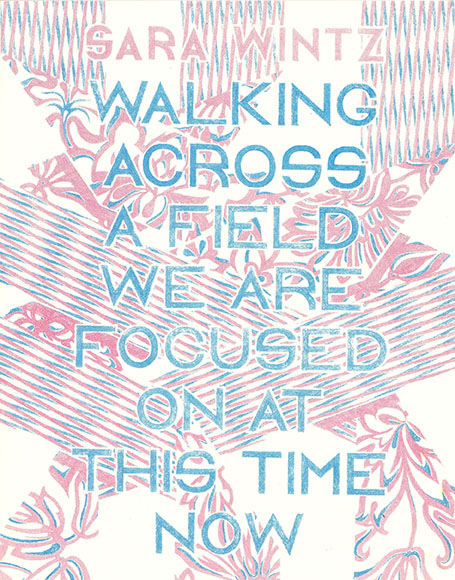
Walking Across a Field We Are Focused On at This Time Now
Sara Wintz
Caitlin Keogh, Contributor
December 2012
an exciting addition to the chorus of voices that make up our poetic heritage
Dodie Bellamy
Walking Across a Field We Are Focused on at This Time Now spirals out of year-by-year Wikipedia searches to tell the story of the twentieth century. In her narrative, Sara Wintz weaves together individual experience with shared (public) history to explore the foundations of facts, time and social identity. This is Sara Wintz’s first book, an epic poem of lyric proportions.
About the Author
Sara Wintz was born in Los Angeles and studied at Mills College, Oxford University, and the Milton Avery Graduate School of the Arts at Bard. She has published Walking Across A Field We Are Focused On At This Time Now (UDP) and the chapbook The Lauras (Sus Press), and edited two collections of poetry. She has curated for the Segue Foundation, Small Press Traffic, and Berkeley Art Museum/Pacific Film Archive. Her poems and prose appear in magazines and anthologies including Chicago Review, Poetic Labor Project, and EOAGH. The subject of an interview with Claire Wilcox at BOMB and audio interviews with Kareem Estefan at Ceptuetics and Tessa Menatian at Word for Word, she also interviews artists and writers about their creative practices for publications including Art Papers and The Creative Independent. Since 2013, she has contributed to the Poetry Foundation’s official blog, Harriet.
Praise
A little bit The Making of Americans, a little bit To The Lighthouse, Walking Across A Field We Are Focused On This Time Now is Sara Wintz’s meditative/historical participation 'in a story of everyone.' The text functions as a glittering Indra’s net, hung with infinite jewels, each reflecting the repeated mutual relatedness among all living beings. How Wintz manages to orchestrate all of this splendor into the span of a metaphoric walk across a field is one of the many compelling facets of the artistry of this book.
Kim Rosenfield
What does it mean to attempt a singularity, to speak or write oneself, to embrace fully a present that slips away into history? There’s an exhilarating vastness to Sara Wintz’s poetics of instability. 'i contain years and if years then centuries.' For Wintz, history is not a graveyard, but a community. Her voice is an exciting addition to the chorus of voices that make up our poetic heritage.
Dodie Bellamy
Sara Wintz embarks into the field of the new century by way of the last, 'walking to extend across' in focused poetic lines and time lines, 'to be part of anything that has happened in language.' The legacy of modernism and its discontents are both a birthright and a burden; 'having come from everything,' Wintz 'insists upon going as a way to find oneself.' Here historical investigation and the testing of poetic language become 'the rehearsal of the doing practice,' where one might find the 'self as appearance among others' — the poet emergent in an expanded field.
David Buuck
Wintz's book employ[s] the garden-path sentences, the blurry signifiers and fragmented jargons of Joyce and Woolf in her deliberations on the intersection of poetry and more formal rhetoric, the inexactitudes of language and knowledge — at times delighting in their marvelous caprice.
Joshua Kleinberg
About the Contributor
Caitlin Keogh‘s paintings and drawings are inspired by 20th-century textile patterns, hand-drawn advertising from the 1930s and the legacy of abstract painting and commerce. She has shown her work at Soloway Gallery, 179 Canal, PS1 Museum, Kunsthalle Zurich, and Motel Campo (Geneva).
In the News
Links
Publication Details
ISBN: 978-1-937027-04-9
Trade Paperback
Perfect-bound. 72 pp, 6.5 x 8.25 in
Publication Date: December 01 2012
Distribution: SPD